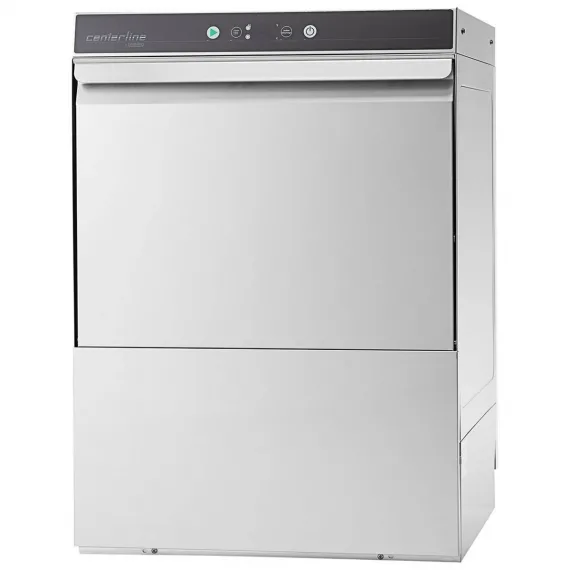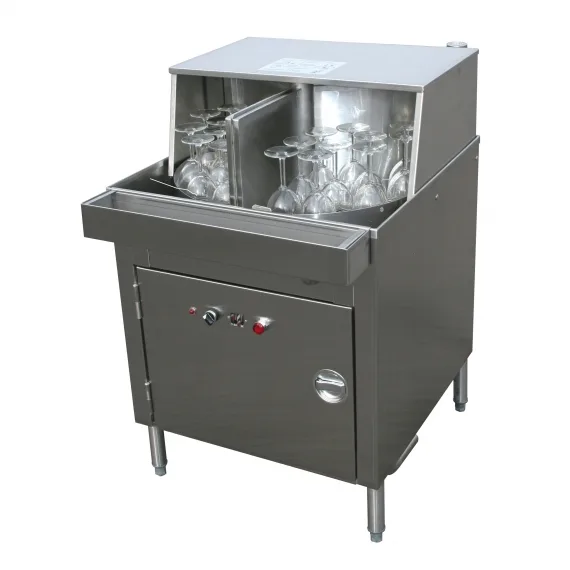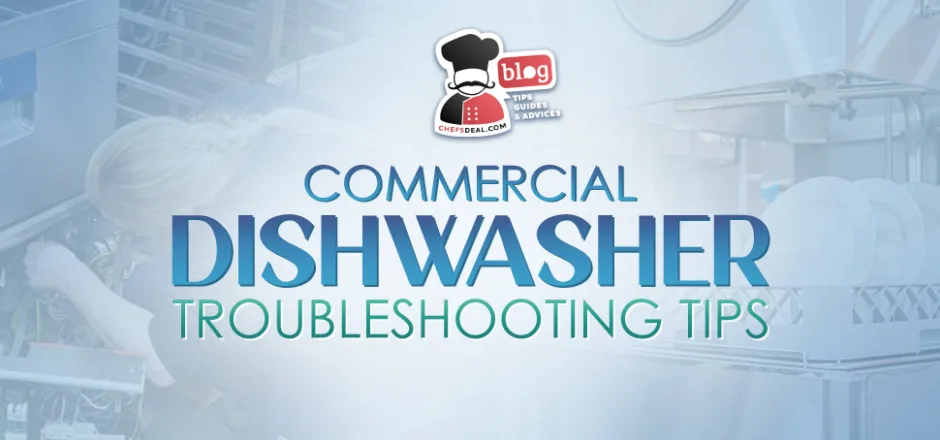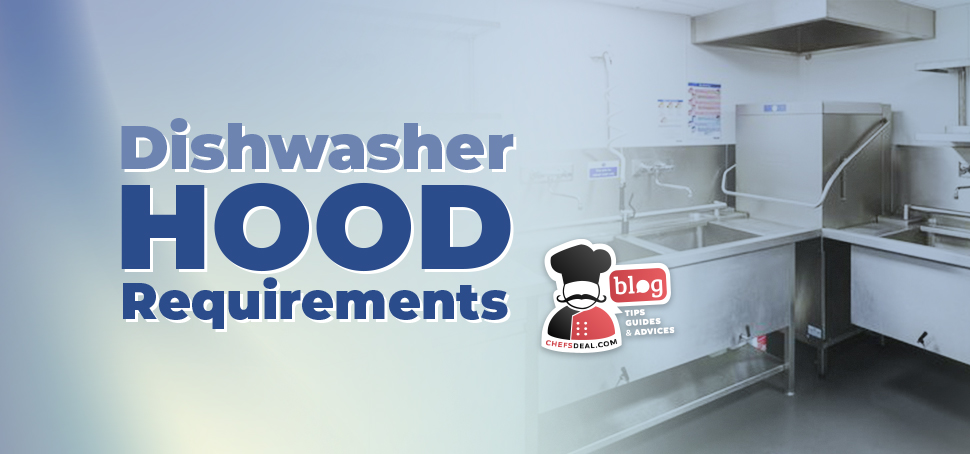In a commercial kitchen, the dishwasher plays a crucial role in tirelessly ensuring that every plate, glass, and utensil is spotlessly clean and ready for the next use. But what happens when this essential piece of equipment encounters issues?
Commercial dishwasher troubleshooting can occur in many ways, and downtime can lead to a cascade of operational challenges, making swift troubleshooting vital. Whether you’re a restaurant owner, a kitchen manager, or a culinary team member, understanding common problems with commercial dishwashers and their potential solutions is crucial.
Since having an idea of how common issues can be remedied could save you a lot of time, energy, and money, in this guide, we’ll examine some common commercial dishwasher troubleshooting tips to keep your dishwasher running efficiently and your kitchen operations smooth. On the other hand, seeking professional maintenance or consulting the manufacturer for more serious issues is always recommended.
Commercial Dishwasher Troubleshooting Tips for 4 Common Issues
There are several common commercial dishwasher troubleshooting cases you could encounter.
1. Dishes are Coming Out Dirty
This is the biggest tell-tale of a problem with a dishwasher. There might be several reasons for this:
- Water might be dirty if the drains and filters haven’t been cleaned. Inspect the pipes and filters attached to the machine to remove any build-ups.
- Misplaced utensils might block the washing and rinsing arms’ rotations. Make sure that the arms are free to turn on before turning on the dishwasher.
- Dishes might have been too dirty before the wash. While commercial dishwashers are fairly strong, you still need to scrape leftovers and hard-to-clean ingredients before placing the dishes into the dishwasher.
- Not enough water might be an issue. Check the water supply to ensure that the machine is sufficiently supplied.
- Improper loading or overloading can interfere with the dishwasher’s capabilities. Ensure you follow the right procedures for loading the racks and do not overload the machine.
- Water temperature being too low can also lower the performance of your commercial dishwasher. Check the temperature settings.
2. The Machine is not Starting

All hope is not lost. If your machine is not starting, there might be several reasons why this commercial dishwasher troubleshooting might be happening.
- There might be a blown fuse issue with the power supply. You should reset or replace the power box to safely supply your equipment with electricity.
- Power cords might be disconnected. Check the plugs and cables to ensure that the connection is sound.
- The door not being properly closed will keep the dishwasher from working. Make sure that the door is properly sealed and there are no obstructions.
3. Spots on Glasses and Dinnerware
Spots are different commercial dishwasher troubleshooting cases from unclean dishes. You could encounter chipping, pitting, tarnishing, etching, stains, fading of patterns and colors, rust, and overall damage to your products. While they may be the result of the issues mentioned above, they could also result from the following:

- Improper dishwasher loading could endanger delicate materials such as glasses and silverware. You can avoid chipping by organizing your dishwasher properly and safely placing delicate materials. You can also invest in a glasswasher to ensure the safety of your glassware.
- Chemical sanitizing machines can cause discoloration and oxidation on your silverware. Ensure your dishwasher is safe for cleaning silverware and avoids extreme chemicals.
- Water hardness, high temperatures, and various chemicals could cause the patterns and colors on your china to fade. To avoid losing the aesthetic of your china
4. Dishwasher Leaking
When a dishwasher starts to leak, it can be a major headache, causing potential hazards and costly repairs. Most cases of commercial dishwasher troubleshooting are related to leaks.
- Leaky boilers & rinse tanks might be the issue. Leaky boilers and rinse tanks are often caused by rust, typically due to limescale build-up. To resolve this issue, replacement is usually the only effective remedy. Limescale hardness varies depending on the water source, and it can lead to blockages, component damage, or sediment accumulation during the rinse cycle. Minerals in the water can form deposits rich in calcium and magnesium, which are highly corrosive and can deteriorate dishwasher components. As the manufacturer recommends, daily cleaning routines and periodic descaling can prevent mineral build-up and rust formation and prevent leaking.
- O-rings deteriorating could cause leaks. O-rings are seals that prevent fluid or air from passing through connecting joints. Over time, rubber and silicone-based o-rings can deteriorate, lose elasticity, or break due to contact with corrosive substances. Dishwashers use o-rings in various components, including drain and rinse pumps, tap fittings, float valves, and pressure switches. O-rings are diversely used in dishwasher components; it’s best to have a qualified technician identify and replace damaged or deteriorated o-rings.
- Door seals deteriorating in general could also be responsible for leaks. The dishwasher door features a rubber gasket that seals it during the wash cycle, which prevents water from escaping. These gaskets can suffer damage, become brittle, or deteriorate with age. A simple visual check can determine the integrity of the seal. If it appears damaged, hardened, or brittle, you should replace it promptly.
- Water inlet valve malfunctioning is a serious issue. The water inlet valve controls the flow of water into the dishwasher. Malfunctions in this valve can result in water pooling at the bottom of the dishwasher, which can potentially cause an overflow during the next cycle. You should ensure the inlet valve is safely fitted and the external housing isn’t cracked or damaged. You should also check the connecting hoses and fittings and ensure they are secure and watertight. And if your valve is sticking, you should replace it to ensure proper water flow control.
- Faulty float assembly or switch could impact the regulation of water use and cause overflows. Usually, the float rises to activate the switch, cutting off the water supply when the required water level is reached. A malfunctioning float or switch can lead to overflows or premature water supply cutoff. You should check the float assembly and switch to ensure they are not damaged and that nothing obstructs the float’s free movement. If your float switch appears to be faulty, it may need replacement.
- Rubber hoses and elbows can deteriorate over time, suffer damage from heat, or sustain mishaps during maintenance or repair. If there are any damaged hoses or elbows in your dishwasher, you should replace them promptly to prevent leaks.
- Hard water is prevalent in residential and commercial settings, leading to limescale build-up on wash and rinse-arm spindles. This corrosive limescale can result in performance loss and leaks in your dishwasher. You should check your wash bosses and spindles regularly to see if there’s any limescale buildup. If limescale build-up occurs, replacement of affected components is necessary to prevent performance loss and leaks.
Commercial Dishwasher Troubleshooting Tips to Avoid 12 Problems
You can follow these commercial dishwasher troubleshooting tips to avoid problems as preventive measures in general.
1. Get Power Surge Protection: Electrical surges can damage your dishwasher’s sensitive electronics. Installing surge protectors safeguards against sudden power spikes and potential breakdowns.
2. Make Sure the Flow Pressure Is Right: Proper water pressure ensures effective cleaning. Check and adjust the water flow to prevent strain on the dishwasher’s components and avoid troubleshooting.
3. Get Regular Maintenance: Scheduled professional maintenance checks can catch potential issues early and keep your dishwasher in top working condition, reducing the risk of breakdowns.
4. Get a Water Softener: Hard water can lead to limescale build-up, affecting performance and causing leaks. A water softener reduces mineral content, preserving your dishwasher’s efficiency.
5. Clean Regularly: Clean filters, spray arms, and interior surfaces to prevent debris accumulation, maintaining optimal dishwasher function.
6. Use the Right Detergent: Selecting the appropriate dishwasher detergent is crucial for effective cleaning and preventing clogs.
7. Maintain Proper Water Temperature: Ensure that your dishwasher operates with the correct water temperature, which can impact cleaning performance.
8. Avoid Dishwasher Overheating: Prevent overheating by ensuring the dishwasher’s thermostat functions correctly.
9. Avoid Using Dishwasher for Non-Dishware Items: Limit your dishwasher to dishware and utensils to prevent damage from non-recommended items.
10. Proper Loading Technique: Learn how to load dishes properly to optimize cleaning and avoid obstructions in the spray arms.
11. Installing a Commercial Water Filter: A commercial water filter removes minerals like calcium and magnesium, contributing to water hardness. This would also extend the lifespan of your dishwasher. If compatible with your dishwasher, you can also use a water softener or descaling system.
12. Educate Staff: Ensure your kitchen staff knows these maintenance tips to avoid common dishwasher problems.
Conclusion
In a commercial kitchen, the dishwasher stands as a pillar of efficiency, ensuring every utensil and dish is ready for the next culinary masterpiece. However, like all machinery, it’s susceptible to challenges that require keen troubleshooting.
Commercial dishwasher troubleshooting tips can make your life easier by fixing minor issues and helping you avoid major problems. Understanding the root causes of common issues and implementing preventive measures can save significant time, energy, and resources. It’s imperative to be proactive, regularly maintain the machine, and educate the team on best practices. At the same time, DIY solutions can address minor hitches; never hesitate to seek professional assistance for more complex problems. A well-maintained commercial dishwasher not only ensures operational efficiency but also upholds the reputation of your culinary establishment.






